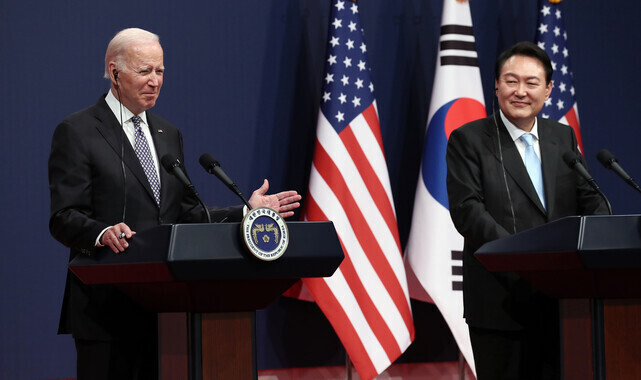hankyoreh
Links to other country sites 다른 나라 사이트 링크
[Column] Why the US invited South Korea to this week’s NATO summit

South Korean President Yoon Suk-yeol is scheduled to attend a summit of the North Atlantic Treaty Organization, known better as NATO, in Madrid at the end of this month.
Explaining the significance of Yoon’s attendance, the president’s national security advisor, Kim Sung-han, said it was about “strengthening the solidarity of values based on liberal democracy with the 30 NATO alliance members and partners.” He also responded to concerns from some quarters that this signified an “anti-China” and “anti-Russia” approach, which he called a “logical stretch.”
So what has been Washington’s aim in spearheading this expanded NATO summit? In this regard, it’s worth noting the action of Kurt Campbell, who has been described as the Biden administration’s “Asia czar.”
Campbell’s job title is “deputy assistant to the president and coordinator for Indo-Pacific affairs in the US National Security Council.” Yet thus far in 2022, he has been meeting frequently with partners in Europe.
In a May 9 talk with the US Center for Strategic and International Studies, Campbell stressed that Europe had “changed.” Whereas European countries were not interested in taking part in Washington’s “rebalance to Asia” strategy during the Barack Obama administration, he noted, there had recently been some “deeply productive” and “extremely professional” discussions on that front.
Nine days later, Jake Sullivan, the White House national security advisor, spelled out what Campbell had meant by his remarks. “For us, there is a certain level of integration and a symbiosis in the strategy we are pursuing in Europe and the strategy we’re pursuing in the Indo-Pacific,” he explained, adding that the connection between them would be a “hallmark” of Biden’s foreign policy presidency.
In late May, US Secretary of State Antony Blinken delivered a speech on China policy in which he made it clear which countries were being targeted. Russia, he said, poses a “clear and present threat,” while China presents the “most serious long-term challenge to the international order.”
Taken together, this suggests that the goal of the NATO meeting is a US-led effort to establish a network of alliances in the Atlantic and Pacific regions. As if to bear that out, the list of invitees includes the leaders of key US allies in the Indo-Pacific region, namely South Korea, Japan, Australia and New Zealand. For the first time in history, the new NATO strategic concept is expected to include a response to the China “challenge.”
Remarking on this in a June 16 press conference, NATO Secretary General Jens Stoltenberg said the event would be a “transformative summit.”
The US and NATO have pushed for the expanded summit as a way of boosting solidarity against Russia and China. But while Yoon Suk-yeol has been invited to that event, his administration continues to insist that it is not “anti-Russia” or “anti-China.” It’s akin to admitting to drinking before getting behind the wheel, but claiming to have not been drunk driving.
When he returns from the summit, Yoon may well speak of the major outcome in terms of “strengthening the solidarity of values” and “securing NATO’s support for North Korea policies.”
But as a country situated on a geopolitical fault line and a geoeconomic crossroads, South Korea needs to be able to see beyond that. It needs to recognize that the emergence of an Atlantic/Pacific alliance network will only lead to greater solidarity between China and Russia — two major Eurasian powers — and a newly nuclear-armed North Korea.
That, in turn, spells escalation for the new Cold War in Asia.
By Cheong Wook-Sik, director of the Hankyoreh Peace Institute and director of the Peace Network
Please direct questions or comments to [english@hani.co.kr]

Editorial・opinion
![[Column] Park Geun-hye déjà vu in Yoon Suk-yeol [Column] Park Geun-hye déjà vu in Yoon Suk-yeol](https://flexible.img.hani.co.kr/flexible/normal/500/300/imgdb/original/2024/0424/651713945113788.jpg) [Column] Park Geun-hye déjà vu in Yoon Suk-yeol
[Column] Park Geun-hye déjà vu in Yoon Suk-yeol![[Editorial] New weight of N. Korea’s nuclear threats makes dialogue all the more urgent [Editorial] New weight of N. Korea’s nuclear threats makes dialogue all the more urgent](https://flexible.img.hani.co.kr/flexible/normal/500/300/imgdb/original/2024/0424/7317139454662664.jpg) [Editorial] New weight of N. Korea’s nuclear threats makes dialogue all the more urgent
[Editorial] New weight of N. Korea’s nuclear threats makes dialogue all the more urgent- [Guest essay] The real reason Korea’s new right wants to dub Rhee a founding father
- [Column] ‘Choson’: Is it time we start referring to N. Korea in its own terms?
- [Editorial] Japan’s rewriting of history with Korea has gone too far
- [Column] The president’s questionable capacity for dialogue
- [Column] Are chaebol firms just pizza pies for families to divvy up as they please?
- [Column] Has Korea, too, crossed the Rubicon on China?
- [Correspondent’s column] In Japan’s alliance with US, echoes of its past alliances with UK
- [Editorial] Does Yoon think the Korean public is wrong?
Most viewed articles
- 1[Column] Park Geun-hye déjà vu in Yoon Suk-yeol
- 2Will NewJeans end up collateral damage in internal feud at K-pop juggernaut Hybe?
- 3The dream K-drama boyfriend stealing hearts and screens in Japan
- 4Thursday to mark start of resignations by senior doctors amid standoff with government
- 5Why Korea shouldn’t welcome Japan’s newly beefed up defense cooperation with US
- 6[Guest essay] The real reason Korea’s new right wants to dub Rhee a founding father
- 7N. Korean hackers breached 10 defense contractors in South for months, police say
- 8[Editorial] New weight of N. Korea’s nuclear threats makes dialogue all the more urgent
- 9Up-and-coming Indonesian group StarBe spills what it learned during K-pop training in Seoul
- 10Terry Anderson, AP reporter who informed world of massacre in Gwangju, dies at 76